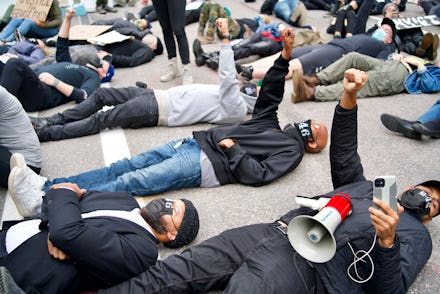The George Floyd murder trial is already off to a chaotic start

The four former Minneapolis Police Department officers accused of killing George Floyd this past spring have requested separate trials, as attorneys sparred during a hearing Friday, foreshadowing what will likely be one of the most scrutinized criminal cases of the coming year.
Former officers Derek Chauvin, Tou Thao, J. Alexander Kueng, and Thomas Lane all appeared in a Hennepin County courtroom where District Judge Peter Cahill presided over nearly four hours of arguments, ranging from different venues for the case, to whether or not separate trials would subject the public to "the trauma of four separate verdict days," as Special Assistant Attorney General Neal Katyal argued.
In a particularly contentious exchange, attorneys for the defendants requested information on whether Floyd, who died after Chauvin knelt on his neck for nearly nine minutes during an arrest for allegedly passing a counterfeit $20 bill, was himself a confidential police informant, or had any criminal ties.
"The victim is not on trial here," prosecutors shot back, offering a glimpse of what will likely become a recurring theme in the case.
Attorneys for the officers have also made a strong push to move the trial — or trials, pending Cahill's decision whether to try the group separately or not — outside of the Twin Cities, given how Floyd's death, and the weeks of social justice protests it launched, may have created an unfair environment for the officers to receive a fair trial.
"There is not a county or state in this country that has not had publicity in the George Floyd case," Cahill responded, saying he'd need more information before deciding whether or not the potential jury pool had been affected.
In one of the more shocking moments of Friday's hearing, Cahill also disqualified Hennepin County Attorney Mike Freeman and Freeman's staff from participating in the trial, criticizing their decision to meet with the local medical examiner and release preliminary information from Floyd's autopsy before an official report had been published. Cahill called the decision "sloppy," but affirmed that Freeman and his staff could still be called as witnesses in the trial.
Hundreds of protesters gathered outside the building where Friday's hearing took place, jeering at the former officers as they left the hearing. Speaking with the crowd following the hearing, Floyd family attorney Benjamin Crump slammed the officers for arguing that drugs found in Floyd's system were responsible for his death.
"The only overdose that killed George Floyd was an overdose of excessive force and racism by the Minneapolis Police Department," Crump explained. "George was lucid, cooperative, obeyed commands, and had situational awareness when he died. The world witnessed his asphyxiation on video, and now defense counsel is asking us to disbelieve our own eyes."
The trial of the four officers is currently scheduled to begin in early March.